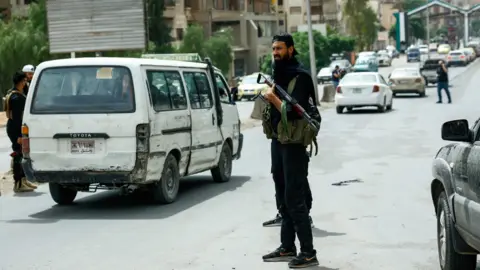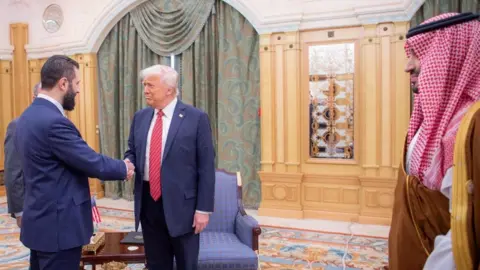Rubio warns Syria could be weeks away from 'full-scale civil war'
 Reuters
ReutersUS Secretary of State Marco Rubio has called for Syria's transitional authorities to be supported, warning that the country could be only weeks away from "potential collapse and a full-scale civil war of epic proportions".
At a hearing of the Senate Foreign Relations Committee, he defended President Donald Trump's decision last week to lift sanctions on Syria before meeting President Ahmed al-Sharaa, a former al-Qaeda commander who led the rebel offensive that overthrew Bashar al-Assad in December.
Trump's rationale was that other countries wanted to help Sharaa's administration and send aid but were afraid of the sanctions, Rubio explained.
There was no immediate comment from Syrian officials.
The US imposed sanctions on Syria in response to atrocities committed by forces loyal to Assad during the country's devastating 13-year civil war, in which more than 600,000 people were killed and 12 million others were forced from their homes.
The State Department had previously insisted on several conditions being met before they were lifted, including protecting religious and ethnic minorities.
Although Sharaa has promised to do that, the country has been rocked by two waves of deadly sectarian violence in recent months.
In March, almost 900 civilians, mainly members of Assad's Alawite sect, were killed by pro-government forces across the western coastal region during fighting between security forces and former regime loyalists, according to one monitoring group. The loyalists reportedly killed almost 450 civilians and 170 security personnel.
And at the start of May, more than 100 people were reportedly killed in clashes between gunmen from the Druze religious minority, the new security forces and allied Sunni Islamist fighters in two suburbs of the capital Damascus and the southern province of Suweida.
Even before the violence, many members of minority communities were worried about the new transitional authorities, which are dominated by Sharaa's Sunni Islamist group, Hayat Tahrir al-Sham (HTS). It is a former al-Qaeda affiliate still designated as a terrorist organisation by the UN, the US, the EU and the UK.
Sharaa himself also continues to be listed by the US as a "specially designated global terrorist", although the Biden administration announced in December that the US would scrap the $10m (£7.5m) bounty offered for his arrest.
 Reuters
ReutersDespite Sharaa's past, Trump took the opportunity to meet him while attending a summit of Gulf leaders in Saudi Arabia last week.
Afterwards, the US president told reporters that he was a "young, attractive guy", adding: "Tough guy. Strong past. Very strong past. Fighter."
"He's got a real shot at pulling it [Syria] together," he said, adding, "it's a torn-up country".
Sharaa meanwhile said Trump's decision to lift the sanctions on Syria "was a historic and courageous decision, which alleviates the suffering of the people, contributes to their rebirth and lays the foundations for stability in the region".
Speaking to the Senate Foreign Relations Committee in Washington DC on Tuesday, Rubio quipped that "the bad news is that the transitional authority figures... didn't pass their background check with the FBI".
"But on the flip side of it is, if we engage them, it may work out, it may not work out. If we did not engage them it was guaranteed to not work out," he added.
"In fact, it is our assessment that, frankly, the transitional authority, given the challenges they're facing, are maybe weeks, not many months, away from potential collapse and a full-scale civil war of epic proportions, basically the country splitting up."
He did not elaborate but said Syria's minorities were "dealing with deep internal distrust... because Assad deliberately pitted these groups against each other".
He said the Trump administration decided to lift the sanctions quickly because "nations in the region want to get aid in, want to start helping them. And they can't because they are afraid of our sanctions".
As Rubio spoke, European Union foreign ministers agreed to also lift economic sanctions on Syria.
"We want to help the Syrian people rebuild a new, inclusive and peaceful Syria," the bloc's foreign policy chief Kaja Kallas wrote on X.
"The EU has always stood by Syrians throughout the last 14 years - and will keep doing so."
The Syrian foreign ministry said the decision marked "the beginning of a new chapter in Syrian-European relations built on shared prosperity and mutual respect".
